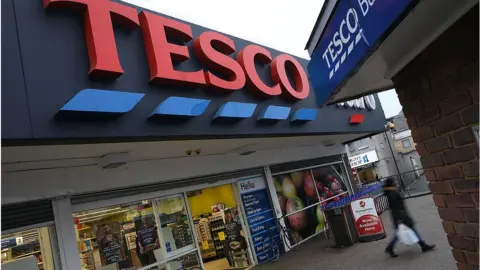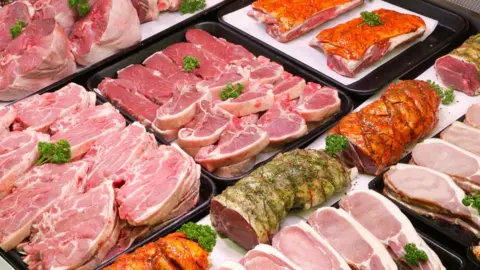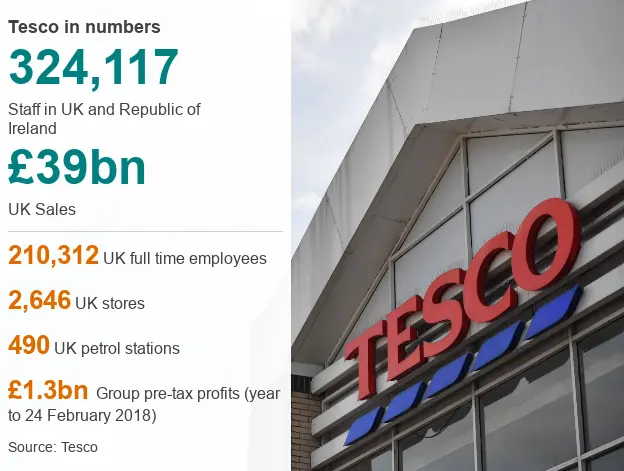Tesco counter cost cuts to hit 9,000 jobs
 Getty Images
Getty ImagesTesco has announced it will close food counters in 90 of its stores as part of a wider cost-cutting plan that will affect 9,000 staff.
The UK's largest supermarket said its remaining fish, meat and deli counters in 700 stores will be run on a full-time or flexible basis.
It confirmed it will no longer offer a hot food service at its canteens and that head office staff will be cut.
It said up to 9,000 workers will be affected but half could be redeployed.
More than 10,000 jobs have been cut at Tesco since the current chief executive, Dave Lewis, took over in 2014.
The UK's biggest grocer is in the midst of trying to save £1.5bn as the competition between supermarkets intensifies.
Tesco said: "Not only are customers shopping in different ways, but we know that they have less time available to shop too - which means they are using our counters less frequently.
"We will be making changes to the counters in our large stores to ensure that we have the right offer for customers."
 Getty Images
Getty Images
Analysis: Theo Leggett, Business correspondent
For a company which makes more than a billion pounds a year in profit, and saw strong Christmas trading, Tesco seems remarkably keen to cut costs. Yet the reasons are pretty plain.
Competition between supermarkets is intense. The German discounters Aldi and Lidl, which arrived on these shores in the 1990s, are now big enough to make a real impact. They're steadily eroding the market share of established players, including Tesco, and forcing them to lower their own prices.
And if competition regulators allow Sainsbury's to take control of Asda, then Tesco will lose its market dominance - and be faced with a rival just as powerful as itself, with as much bargaining power among suppliers. That could place further pressure on pricing - and profit margins.
In-store butchers and delicatessens may look pretty and please more discerning customers, but they need to be staffed; and staff cost money. Tesco insists the number of people using them is falling as shopping habits change. Seen in that light, getting rid of a few looks like an easy way to save a bit of cash.
But Tesco needs to be careful. Removing the things that make it different from the discounters may help it to cut costs - but it risks alienating existing consumers and eroding its brand value.
After all, if there is nothing to differentiate the traditional supermarkets from the discounters, won't customers simply go to whichever is cheapest - trapping everyone in an endless cycle of cost cutting and ever-decreasing margins?

Pauline Foulkes, national officer at the Union of Shop, Distributive and Allied Workers (Usdaw), said: "Staff at Tesco are shocked and dismayed by the scale of yet another round of potential job losses, which clearly demonstrates the pressure retailers are under in the current very difficult and uncertain economic climate, as the cost cutting continues.
"This is devastating news for staff, who have played a crucial role in Tesco's turnaround project, contributing to 12 successive quarters of growth, solid Christmas trading and over a billion pounds of profit."
As well as reducing its counters, Tesco said that after completing a detailed review: "We're talking to colleagues about changes in some of our head office teams, moving to a simpler and leaner structure, which will allow us to focus on supporting our customers."
It also said that it made changes to the way it manages its stock which will mean "a significantly reduced workload, with fewer hours needed to complete the routines".
Meanwhile, people who work for third party caterers that provide hot food services at some Tesco stores are also facing an uncertain future.
Tesco said it will introduce self-service kitchen areas which will affect people employed by caterers.
"We are working with them to provide as much support as we can," said Tesco.

